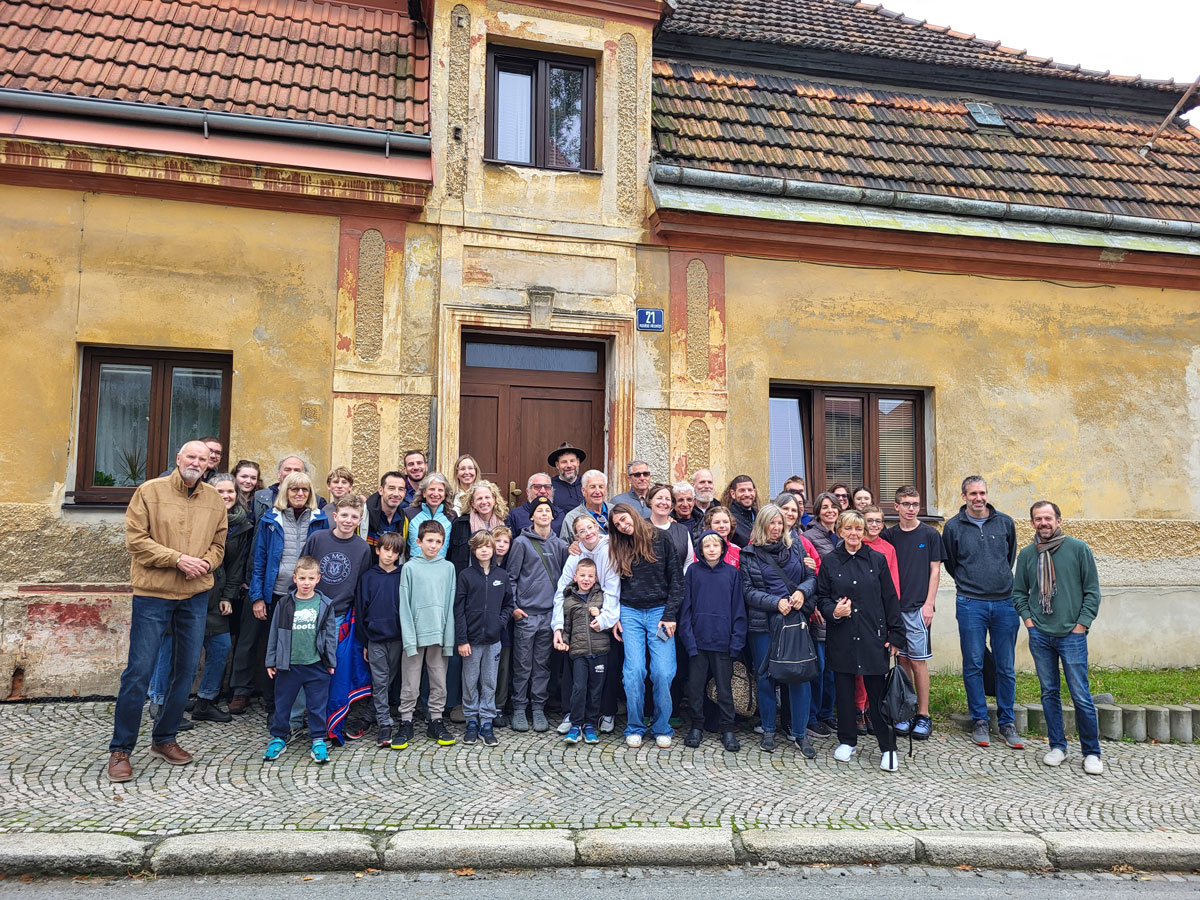
December 2024
Rachel Loewith Rochwerg
As our eldest son began to approach Bar Mitzvah age, my husband Bram and I considered different ways we could mark this important milestone. We wanted to celebrate his Bar Mitzvah in a way that would feel meaningful to Nate and to us, and lay a foundation for his Jewish future that honours his heritage and history. In that spirit, we chose to have Nate’s Bar Mitzvah in the Czech Republic. Nate’s maternal great-grandparents, Minna and Joe Loewith, came to Hamilton in 1938 as refugees from Czechoslovakia, along with 37 extended family members, so the country is an important part of our history.
We were fortunate to connect with Rabbi David Maxa, a warm, wonderful, and progressive rabbi based in Prague. He enthusiastically supported our hope to have Nate become a Bar Mitzvah at the Great Synagogue in Pilsen, where my great grandparents, Leo and Ida Abeles, were married in October 1921. The Great Synagogue is the second largest synagogue in Europe, and a truly magnificent building. It escaped destruction during World War II because it was used to store ammunition and Jewish belongings confiscated by the Nazis.
The Great Shul was returned to the Jewish community in 2016, and is now used as a museum, housing the permanent collection “Here lived the Jews.” Today, there are fewer than 100 Jews in the Pilsen community. They gather in a small room in the building to mark holidays, but there is no active congregation. Nobody could tell us the last time a Bar Mitzvah was held in the synagogue. However, after Rabbi Maxa explained why we wanted to use this space, the community members welcomed and supported us.
Recognizing this once-in-a-lifetime opportunity to learn about our family’s origins, we were blessed to be joined in the Czech Republic by 78 family members and friends, from ages three to 84. Rochwerg and Loewith mishpocha travelled from Hamilton, Toronto, London, New York, Michigan, New Mexico, England, Switzerland and Israel. We spent the week based in Prague, learning about both its long Jewish history and the country’s broader history, and feasting on schnitzel and dumplings. We travelled to Terezin, the concentration camp where many of our relatives who were not able to flee were held, and ultimately transported to and killed in Auschwitz.
The day before the Bar Mitzvah, three generations of Loewiths loaded onto a coach bus to Bohemia — the westernmost part of the Czech Republic, near the German border, to visit our family’s ancestral villages. In advance of our trip, my grandmother’s 103-year-old cousin, the only living member of the original group of 38 refugees, had put me in touch with a local citizen of the village of Horsovsky Tyn. Ludek, a complete stranger, arranged for the most wonderful day for us in his community. We were welcomed by the mayor in front of the town’s Holocaust memorial. Ludek (who is not Jewish but has a keen and seemingly encyclopedic knowledge of the local Jewish history) guided us through town by foot to every home and building that had been owned by Jews prior to 1939, many of whom were our relatives.
As a family, we gathered in front of Joe Loewith’s family’s general store — a store, building, and livelihood stolen from him by the Nazis — and here we returned, 50 people strong; his three sons, all nine of his grandchildren, and 20 of his 24 great grandchildren, plus many of our partners. As we drove seven kilometres down the country roads to Blizejov — the small village that my grandmother, Minna, grew up in — we listened to the farmers amongst us analyze the fields and barns that once belonged to their predecessors. We stood in front of the homes of my grandparents, and great great grandparents, while the younger kids played football and wrestled in the grass. We imagined what their life had been like before 1938, and starkly compared it to what initially waited for them upon arrival in Canada. It was a deeply meaningful day for us all.
On the day of Nate’s Bar Mitzvah, our family and friends were joined by a handful of members from Rabbi Maxa’s Prague congregation and people from Pilsen’s small Jewish community. We were told that we more than doubled the Jewish community of Pilsen for the day. We watched as Nate, on the elaborate and ornate bimah, chanted his Torah and haftarah portions, and gave his d’var Torah. Words cannot describe the mix of nachas, connection, and sentimentality we felt seeing him on the very bimah where his great great grandparents were married 103 years earlier.
After the service, the members of the local Jewish community joined us for lunch at a nearby hotel, and as we all danced the horah through the restaurant. While the waitstaff looked on with wonder and amusement, we celebrated both our Jewish history and our Jewish future. I wondered if my grandparents could have ever imagined so many of their descendants celebrating all these years later in the Czech Republic, a country that my grandfather felt so deeply betrayed by, and my grandmother loved so dearly.
There is no shortage of conflict in this world. Religion and politics and land continue to tear people apart. We are so grateful for our life here in Canada and are immeasurably indebted to those whose countless sacrifices made it possible. We can think of no better way to teach our son the true meaning of becoming a Bar Mitzvah.



